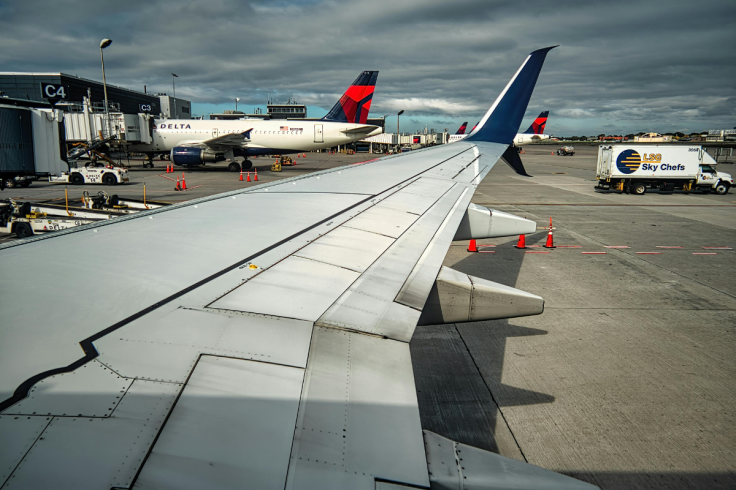Why Are Companies Pulling Out Of Austin Airports? Delta Airlines Cancelling Flights Is Latest To Abandon US City
Official stats from the City of Austin show enplanements fell 5.35% January-May 2025

Delta Air Lines will terminate all flights between Austin-Bergstrom International Airport and Midland-Odessa on 8 November 2025, marking a sharp retreat from intra-regional connectivity.
It's the latest sign of airlines rethinking routes amid softening demand.
Delta launched the Austin-Midland route in April 2024 using small regional jets, but low passenger loads, often below 60%, made it commercially unviable. The airline cited customer demand as the reason for the 8 November cut, reallocating resources to higher-growth routes such as new non-stops to Denver and Columbus.
Delta's Sudden Midland Exit Disrupts West Texas Travel
This mirrors Delta's earlier cancellation of its Austin-Harlingen service, reinforcing a broader strategy of trimming underperforming regional links. With Southwest now dominating the 200-mile hop, travellers face fewer choices and potential fare hikes.
Midland Councilwoman Robin Poole, liaison to the Airports Department, acknowledged disappointment over Delta's withdrawal but reaffirmed the city's commitment to Midland International Air & Space Port. City officials confirmed they are actively exploring opportunities to expand destination offerings to and from Midland.
American Airlines Slashes 35 Routes from Austin Since 2023
American Airlines has aggressively cut capacity at Austin, eliminating 35 nonstop routes, including international destinations in the Bahamas and Mexico, since early 2023. Passenger numbers plunged 22.6% year-to-date through May 2025, dropping the carrier to third place behind Delta and Southwest.
Economic headwinds explain the retreat. Austin's post-pandemic boom has cooled, with metropolitan population growth slowing from 159 daily newcomers in 2023-2024 to near stagnation.
Airlines report overcapacity on regional links, forcing adjustments to maintain profitability amid rising fuel costs and a 5.61% dip in overall airport traffic through May 2025.
- Total passengers at Austin-Bergstrom: 10.3 million January-June 2025, down 4.55% from 2024.
- American's share: 16.8%, versus Delta's 16.8% surge.
- Cargo volume: Down 10.8%, signalling weaker business freight.
FAA Staffing Shortages Spark Ground Stops, Delay Flights in 2025
Chronic understaffing at the FAA's Austin tower, 29 controllers versus a 60-person target, has triggered multiple ground stops this year, halting arrivals from Houston and Dallas. A March 2025 incident grounded flights for hours, stranding passengers like teacher Hope Smith: 'It doesn't sound like a good time to be in customer service for Delta.'
The FAA denied Austin's Class B airspace upgrade in June 2025, citing insufficient annual operations, 300,000 versus 261,000 in 2024, despite surpassing figures at eight existing Class B airports. Rep. Lloyd Doggett called it 'bureaucratic delay,' warning of safety risks as overtime burdens staff.
Nationwide shortages hit 3,000 controllers, per FAA data, exacerbating 2025's 5-10 monthly disruptions.
Softening Economy Hits Austin Travel Demand Hard in 2025
Austin's reputation as a tech-tourism hub is fading, with passenger traffic down 1.6% to 21.76 million in 2024 and similar declines projected for 2025. Airlines like Allegiant closed its Austin base in January, slashing a dozen routes, while Hawaiian ended Honolulu service in March.
Official stats from the City of Austin show enplanements fell 5.35% from January to May 2025, driven by economic uncertainty and reduced business travel. Social media users echo frustrations: @ATXJetsetter noted Delta's Midland cut as part of Austin's 'focus city' pivot, potentially limiting regional access.
Delta Air Lines is cancelling all flights to Midland-Odessa amid a broader expansion of its Austin focus city.https://t.co/wt5esjT0zp
— ATXJetsetter - Austin's Frequent Flyer (@ATXJetsetter) August 24, 2025
Broader US trends, per FAA reports, link flight reductions to a 2.8% Q1 GDP contraction forecast. Despite cuts, Delta's growth, 1.7 million passengers through June, up 11.3%, shows selective optimism. Yet, for locals, fewer flights mean higher costs and inconvenience.
Reductions threaten Austin's £69 billion ($94 billion) aviation-driven economy, per TxDOT data, as fewer flights curb tourism and business. A 9% inbound tourism drop could cost £12-18.51 billion ($9-25 billion) nationally, with Austin's festivals and hospitality sector among the hardest hit.
© Copyright IBTimes 2025. All rights reserved.





















